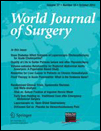Short- and Long-term Outcomes After Laparoscopic Versus Open Emergency Resection for Colon Cancer: An Observational Propensity Score-matched Study
Preliminary data were part of an oral presentation at the ISLCRS (International Society of Laparoscopic Colorectal Surgery) meeting in Hong Kong, November 2–4, 2012.
Abstract
Background
Case series suggest the feasibility and safety of emergency resection of colon cancer by laparoscopy. The present study compares short- and long-term outcomes of laparoscopic and open resection for colon cancers treated as emergencies.
Methods
The study was a propensity score-matched design based on a prospective database. From October 2006 to December 2011, emergency laparoscopic colon cancer resections were 1:2 propensity score-matched to open cases. Covariates for match-estimation were age, gender, American Society of Anesthesiologists grade, procedure type, tumor site, and reason for emergency surgery. Short-term outcomes included oncological quality surrogates (lymph node harvest and R stage), need for a stoma, length of hospital stay, and postoperative complications. For long-term outcomes, overall and recurrence-free survival rates were analyzed with Kaplan–Meier curves.
Results
During the study period, a total of 217 colon cancers were resected (181 open and 36 laparoscopic) as emergencies. The laparoscopic cases were matched to 72 open cases. Median follow-up was 3.6 [95 % confidence interval (CI) 2.3–4.3] years. The overall 3-year survival rate was 51 % (95 % CI 35–76) in the laparoscopic group versus 43 % (95 % CI 32–58) in the open group (p = 0.24). The 3-year recurrence-free survival rate in the laparoscopic group was 35 % (95 % CI 20–60) versus 37 % (95 % CI 27–50) in the open group (p = 0.53). Median lymph node harvest (17 vs. 13 nodes; p = 0.041) and median length of hospital stay (7.5 vs. 11.0 days; p = 0.019) favored laparoscopy.
Conclusions
Our data suggest that selective emergency laparoscopy for colon cancer is not inferior to open surgery with regard to short- and long-term outcomes. Laparoscopy resulted in a shorter length of hospital stay.




